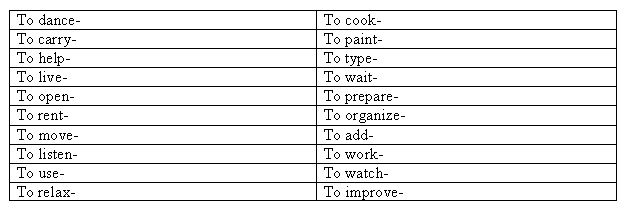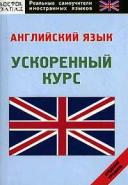Книга: Английский язык: самоучитель
FOCUS ON GRAMMAR Активная грамматика
Разделы на этой странице:
FOCUS ON GRAMMAR
Активная грамматика
Language focus 1
Was/were
Прошедшее время глагола to be – was/were
Глагол to be в прошедшем времени имеет следующие формы: was/were.
I was a student.
You were a student.
She was a student.
He was a student.
It was a student.
We were students.
You were students.
They were students.

Чтобы задать вопрос, глагол was/were выносится в начало вопроса.
Was she a student last year?
Were they in the audience room an hour ago?
Чтобы задать специальный вопрос, was/were ставится сразу за вопросительным словом.
Where were you on Sunday?
When was she at the soccer match?
При построении отрицательного предложения используется not в следующих формах: wasn’t (was not), weren’t (were not).
It wasn’t really awful.
The people weren’t tired.
1. Translate the sentences.
Переведите предложения.
1. Путешествие было замечательным, не так ли?
………………………………………………………………………………
2. Прошлый век был очень тяжелым для нашей страны.
………………………………………………………………………………
3. В ящике не было ножей и вилок.
………………………………………………………………………………
4. Где Вы были на прошлой неделе?
………………………………………………………………………………
5. Погода была холодной и дождливой в прошлые выходные.
………………………………………………………………………………
6. Кто был королем в том веке?
………………………………………………………………………………
7. Наш перелет не был комфортабельным.
………………………………………………………………………………
8. Дети не были уставшими после футбольного матча.
………………………………………………………………………………
2. Answer the questions.
Ответьте на вопросы.
1. Where were you last Monday?
2. Where were your children yesterday?
3. Who was at home yesterday evening?
4. Was your last flight comfortable?
5. Was the soccer match interesting?
6. When was your last holiday?
7. Was the weather cold or hot last week?
8. Was your flat furnished two years ago?
9. Were you interested in natural environment last year?
10. Was your wife keen on sport three years ago?
3. Complete the sentences.
Дополните предложения, используя was или were.
1. ………… you at school yesterday?
No, ………… ……… at work.
2. ……… your father at work yesterday?
Yes, he ………….
3. ………… your children at school yesterday?
No, they ……… They ………… at home.
4. ………… David at work yesterday?
No, he ……… He ………… at home.
5. ………… Natalie and Kevin at work yesterday?
No, they …………. They ……… out.
6. ………… your friend at at work.
Language focus 2
The Past Simple (Indefinite) Tense
Прошедшее неопределенное время
В английском языке прошедшее действие может передаваться временем Past Simple (Indefinite), которое используется со следующими указателями времени:
Yesterday – вчера;
Last week – на прошлой неделе;
Last month – в прошлом месяце;
Last year – в прошлом году;
Two years ago – два года назад;
In 1995 – в 1995, и т. д.
Для построения высказывания необходимо поставить в прошедшее время глагол. Все глаголы английского языка делятся на правильные и неправильные.
Правильные глаголы образуют формы прошедшего времени по правилу:
Глагол+окончание ed.
Например, to play-played, to look-looked.
Произношение и правописание:
Окончание ed произносится как [d] после гласного или звонкого согласного: stayed, listened. После глухого согласного, шипящего или свистящего оно произносится [t]: kissed, cooked. После t и d – как [id]: to found (основывать) – founded.
Если глагол заканчивается на y с предшествующей согласной – она меняется на i и добавляется окончание ed: to copy-copied.
Если глагол заканчивается на согласную с предшествующей краткой гласной – конечная согласная удваивается (чтобы сохранить при произношении звучание закрытого слога) и добавляется окончание ed: to stop – stopped [stopt].
Если глагол заканчивается на немую e, то окончание будет просто d: to use-used
Неправильные глаголы образуют формы прошедшего времени по историческому принципу. Их необходимо запомнить как наиболее употребляемые. Мы приведем для запоминания в этом уроке десять основных:
To be – was/were (см. Focus on Grammar, Language focus 1)
To begin-began
To build-built
To come-came
To do-did
To go-went
To have-had
To read-read [red]
To see-saw
To take-took
Например: He goes to work every day. But last week he went to work only on Monday.
Общие вопросы в прошедшем неопределенном времени задаются с помощью вспомогательного глагола did (кроме глагола to be, который сам себе вспомогательный глагол в прошедшем времени – was/were), который съедает окончание прошедшего времени у глагола (ed) или форму прошедшего времени (у неправильных глаголов).
Например:
Правильные глаголы
He played tennis last Tuesday.
Did he play tennis last Tuesday?
He didn't play tennis last Tuesday.
Неправильные глаголы
We saw him yesterday.
Did we see him yesterday?
We didn't see him yesterday.
Формула специальных вопросов: When did he come home yesterday? (вопросительное слово+did+подлежащее+глагол +наречие времени).
Но вопрос к подлежащему: Who came home yesterday? (вспомогательный глагол не выносится)
4. Form the past simple of the regular verbs. Read them aloud.
Образуйте форму прошедшего неопределенного времени у следующих правильных глаголов. Прочтите эти формы вслух.
Например: To play – played
To dance -
To carry -
To help -
To live -
To open -
To rent -
To move -
To listen -
To use -
To relax -
To cook -
To paint -
To type -
To wait -
To prepare -
To organize -
To add -
To work -
To watch -
To improve —

5. Change the sentences in the Present Simple Tense into the Past Simple Tense. Use the following adverbs.
Поставьте предложения в прошедшее время. Используйте следующие наречия времени:
Yesterday, last year, last month, a week ago, in 2004, last Friday, three years ago, last night.
Например:
She goes to the nursery every day. She went to the nursery on Monday.
1. The boss usually signs the documents.
2. We always prepare a present for him.
3. He lives in a beautiful castle.
4. He often adds much salt to the soup.
5. They listen to rock music every night.
6. The audience always helps him.
7. We usually discuss our flight with our friend.
8. She often visits this monastery.
6. Complete the sentences with one of these verbs. Use them in the Past simple Tense.
Дополните предложения глаголами по смыслу, используя их формы прошедшего времени.
Take, see, come, have, go, build, begin, read, do, be.
1. Last year we ……………… a new house.
2. She ……………… the Queen of this country in the last century.
3. They ……………… to speak English well when they were 17.
4. My mother ……………… forks and knives from the drawer 5 minutes ago.
5. I ……………… three visitors in the audience room on Monday.
6. On holidays he ……………… caravanning.
7. I ……………… a comfortable journey to Spain last year.
8. The children ……………… their homework last night.
9. I ……………… a wonderful book about the last century last week.
10. Last weekend I ……………… to the studio and saw my friend there.
7. Make up interrogative and negative sentences. Give their translation.
Составьте вопросительные и отрицательные предложения. Переведите их на русскийязык.
Например:
The professor went water-skiing on Monday.
Did the professor go water-skiing on Monday?
The professor didn’t go water-skiing on Monday.
He read much about the history of this country.
…………………………………………………………………………
…………………………………………………………………………
The king lived in a wonderful castle.
…………………………………………………………………………
…………………………………………………………………………
I saw his new studio yesterday.
…………………………………………………………………………
…………………………………………………………………………
The visitors discussed their problems there.
…………………………………………………………………………
…………………………………………………………………………
They built a new bath in their house.
…………………………………………………………………………
…………………………………………………………………………
The weather was cold and wet yesterday.
…………………………………………………………………………
…………………………………………………………………………
8. Find a mistake in each of the sentences.
Найдите ошибку в каждом из данных предложений.
1. Why were you be tired after the flight?
2. Many visitors comed to the castle last year.
3. He prepareed a wonderful present for me last month.
4. Where lived they last year?
5. Who did organize that journey?
6. I went caravanning and see natural environment.
7. I didn't improved my Spanish when I went to Spain.




